 Flying Copper © Banksy 2003
Flying Copper © Banksy 2003
Banksy
270 works
Unfortunately, the days where you could buy a Banksy print for £40 from the boot of a car, as was the case with his Flying Copper in 2003, (now one of his most prolific works) are long gone.
To learn more about this work and its legacy, see our 10 facts below:
Flying Copper first appeared at Banksy’s Turf War exhibition
 Flying Copper (AP pink face) © Banksy 2003
Flying Copper (AP pink face) © Banksy 2003Turf War was Banksy’s first major exhibition, held in a warehouse in East London in 2003. There, a series of cardboard cut-out Flying Coppers hung from the ceiling, surrounding Banksy’s punk portrait of Winston Churchill (also titled Turf War). The exhibition introduced other now-iconic Banksy works and motifs – including Toxic Mary and spray-painted animals, which he would feature in his infamous Barely Legal exhibition in 2006.
Why does Banksy give the police smiley faces?
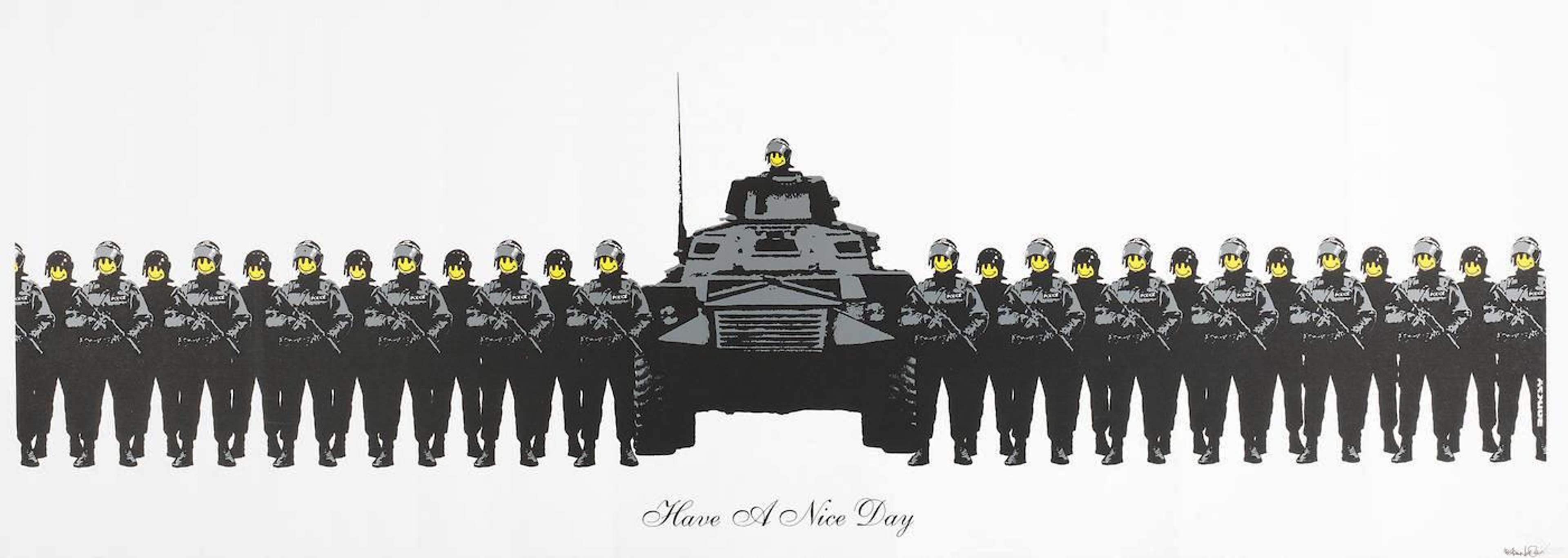 Have A Nice Day © Banksy 2003
Have A Nice Day © Banksy 2003Interpretations of Banksy's Flying Copper‘s smiley face are threefold. The yellow smiley face evokes the nostalgic happiness, simplicity, and innocence of childhood – a recurring theme in many of Banksy’s works. It is also a motif associated with the acid house music scene of the 1990s, and the heady, perhaps less innocent pleasure associated with illegal raves. Thirdly, as the cheerful face appears in complete contrast with the riot officer’s heavy armour and machine gun, it is used to disarm and unsettle the viewer – this sinister juxtaposition positions the officer as the arbiter between the nostalgia for rave's heyday, and the darker, repressed status of the subculture.
Banksy also features the yellow smiley face in his print Have A Nice Day.
What is the meaning of Banksy’s Flying Copper?
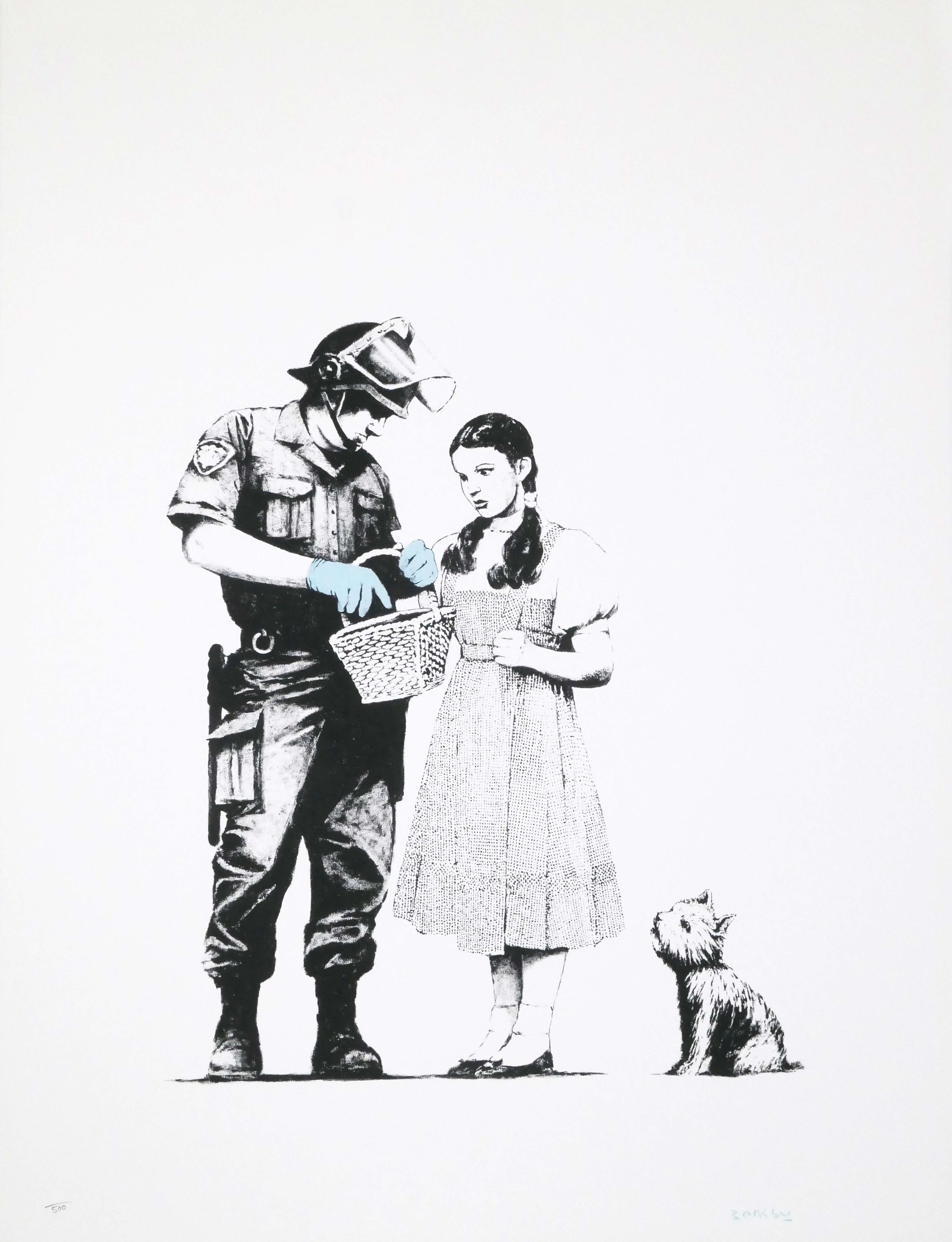 Stop And Search © Banksy 2007
Stop And Search © Banksy 2007Flying Copper shows Banksy’s distrust of authority: the riot officer’s wings may look angelic, but they are small and useless compared to the oppressive machine gun and riot gear. The office hides behind a smiling face and façade of benevolence but is, in reality, a dangerous threat – a reference to police brutality that is as relevant now as it was back in 2003.
Flying Copper murals have appeared around Europe
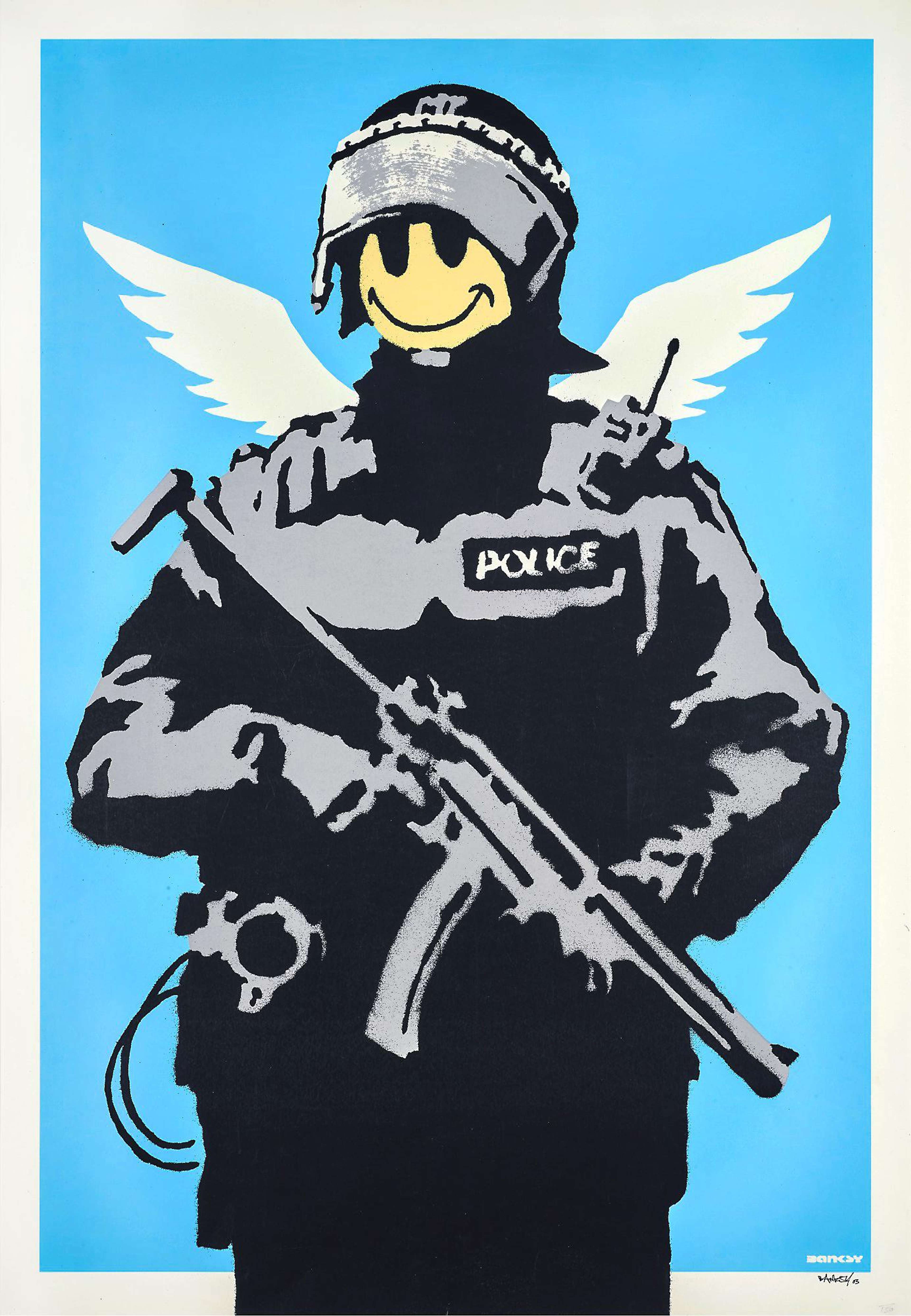 Flying Copper (Blue) © Banksy 2003
Flying Copper (Blue) © Banksy 2003Soon after the Turf War exhibition, Banksy created Flying Copper murals in Vienna, London and Berlin. Some featured the artist’s red signature tag, while others had red blood-like paint splatters, which added a greater sense of violence and threat to the already subversive image.
A row of Flying Coppers was stolen from Shoreditch
After Banksy installed a row of Flying Coppers on the railway bridge in Shoreditch, East London, a part of the artwork was soon stolen. The incident was included in the 2012 documentary 'How to Sell a Banksy'.
Of course, the irony is that a stolen Banksy mural is difficult to sell on, especially if it was removed with profit in mind. Banksy’s authentication body Pest Control does not issue certificates of authenticity for murals, in order to dissuade people from stealing the artist’s work from the streets.
To Discover London’s Top 12 Banksy Murals, see our article.
Banksy released Flying Copper as editioned prints in 2003
 The rarest variation of Banksy's Flying Copper: one of only 8 artist's proofs with a blue background and pink smiley. (Flying Copper (AP pink face) © Banksy 2003)
The rarest variation of Banksy's Flying Copper: one of only 8 artist's proofs with a blue background and pink smiley. (Flying Copper (AP pink face) © Banksy 2003)The artist made 150 signed and 600 unsigned limited-edition prints with a yellow smiley face and bright blue background. In addition, there was a rarer edition of 63 signed prints with a bright pink background, and the rarest: just 8 signed artist’s proof featuring a pink smiley face.
The first Flying Copper prints were sold from the boot of a car
 Banksy's depiction of an auction house is a far cry from his early days of selling from car boots. (Morons © Banksy 2007)
Banksy's depiction of an auction house is a far cry from his early days of selling from car boots. (Morons © Banksy 2007)Back in 2003, when Flying Copper prints were first released, Banksy and his then-agent Steve Lazarides sold them out of the back of Lazarides’ car for just £40 a print. They can now sell for up to £110,500 (with fees) at auction.
Flying Copper is famously one of Banksy’s largest prints
 Banksy's Flying Copper is a large print by the artist's standards, but easily framed. (Image © Sotheby's 2020 / Flying Copper © Banksy 2004)
Banksy's Flying Copper is a large print by the artist's standards, but easily framed. (Image © Sotheby's 2020 / Flying Copper © Banksy 2004)At 70 x 100cm, it is also one of Banksy’s easiest prints to frame, as it fits into a standard-size poster frame available in many shops. Banksy’s other prints are smaller: for example, Girl With Balloon measures 50 x 70cm.
Banksy has a complicated relationship with the police
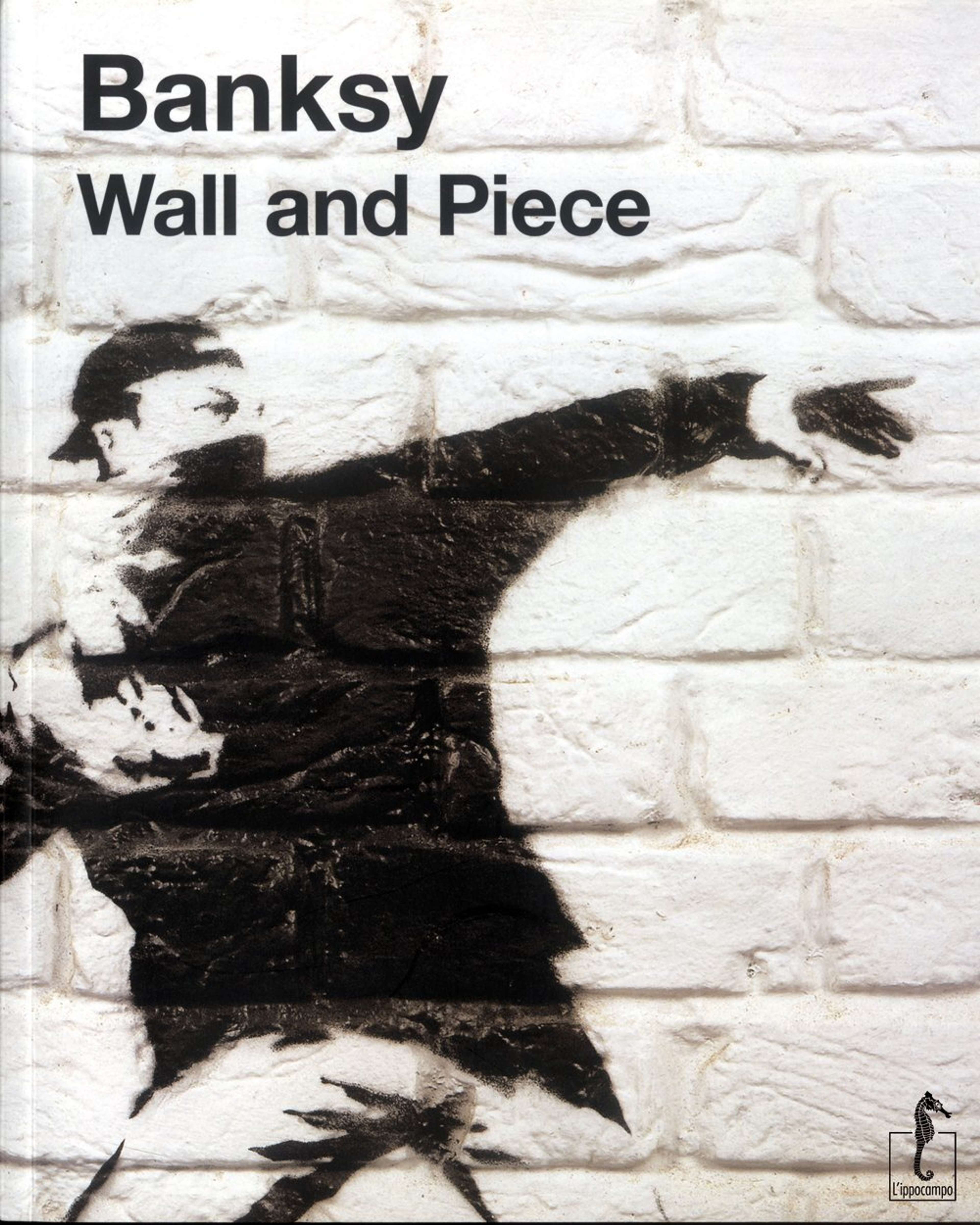 Wall And Piece Front Cover © Banksy 2003
Wall And Piece Front Cover © Banksy 2003On the back of Banksy’s book Wall And Piece, he included a statement from a Metropolitan Police Spokesperson: “There’s no way you’re going to get a quote from us to use on your book cover.” “My main problem with cops is that they do what they’re told. They say, ‘Sorry mate, I’m just doing my job’ all the fucking time,” Banksy wrote in his 2001 book Banging Your Head Against A Brick Wall.
Which other Banksy prints ridicule the police?
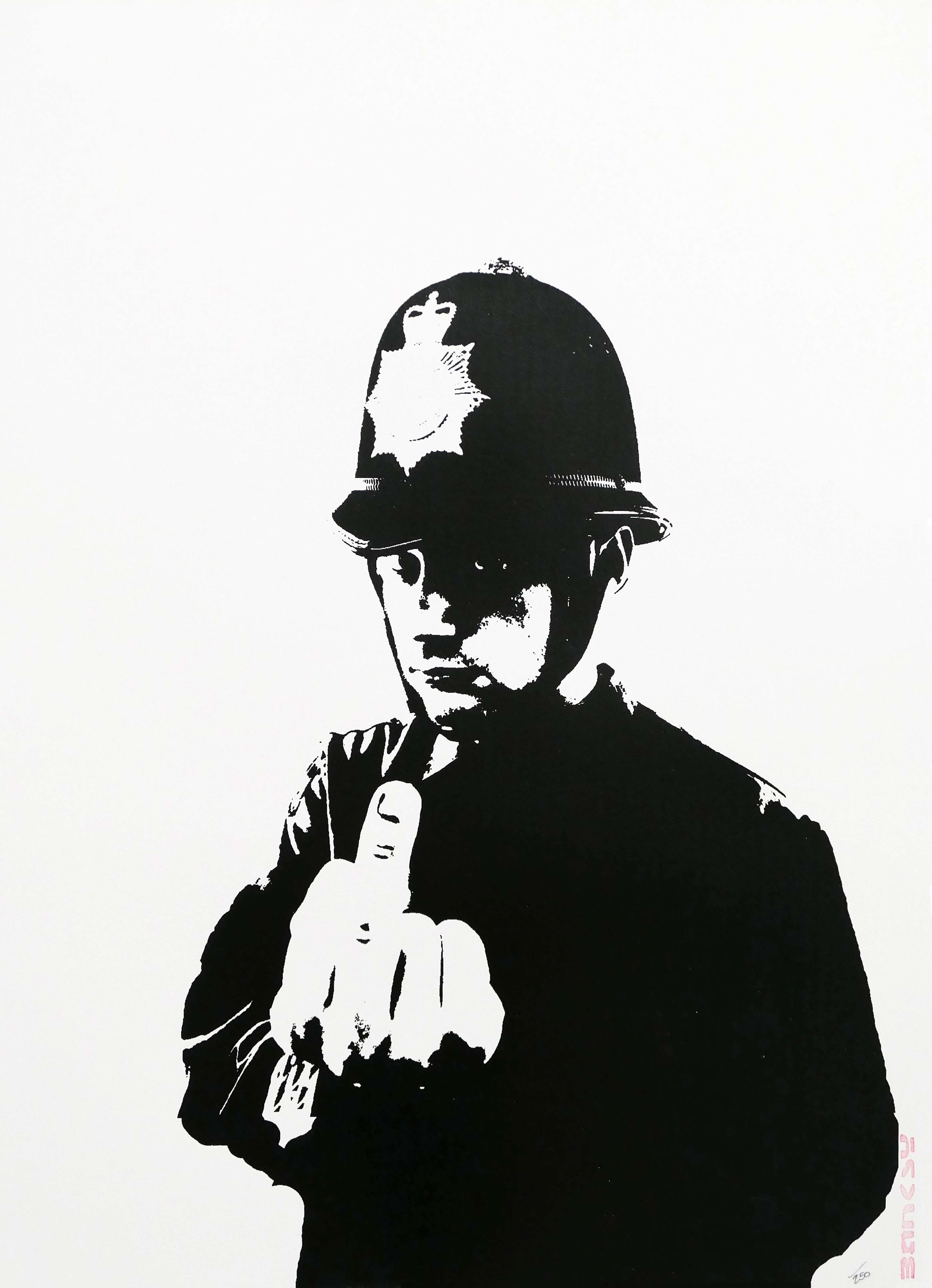 Rude Copper © Banksy 2002
Rude Copper © Banksy 2002Banksy was first inspired to use stencils while hiding from the police on a night out tagging, and he has used them as the subject of satire and social commentary ever since. Stop And Search references the controversial ‘stop and search’ legislation and the police force’s prejudice against ethnic minorities, while Rude Copper turns the idea of the kind-hearted British bobby on its head as the policeman gives the viewer the middle finger.

